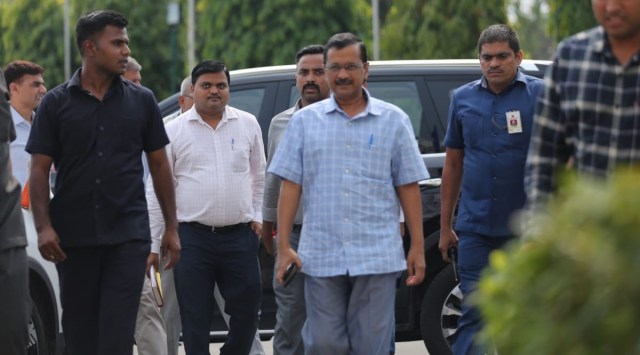Prohibition Act used to earn through illegal liquor trade: Kejriwal
Arvind Kejriwal, who is on a two-day visit to Gujarat, visited Sir Takhtasinhji General Hospital in Bhavnagar city where 66 people who were taken ill allegedly after consuming spurious liquor are undergoing treatment.
 Responding to Education Minister Jitu Vaghani’s statement appealing to political parties to refrain from playing politics over it, the Delhi CM accused the BJP of practising “politics of corruption”.
(File Photo)
Responding to Education Minister Jitu Vaghani’s statement appealing to political parties to refrain from playing politics over it, the Delhi CM accused the BJP of practising “politics of corruption”.
(File Photo)Delhi Chief Minister and Aam Aadmi Party (AAP) convener Arvind Kejriwal said that Prohibition Act in Gujarat is used as a cover to earn money through illegal liquor trade and accused the ruling Bharatiya Janata Party (BJP) of playing with the lives of the people.
Kejriwal, who is on a two-day visit to Gujarat, visited Sir Takhtasinhji General Hospital in Bhavnagar city where 66 people who were taken ill allegedly after consuming spurious liquor are undergoing treatment.
Quoting survivors of the hooch tragedy, the Delhi CM said that liquor is openly sold in villages and towns of Gujarat. “This puts a huge question mark on the Prohibition Act. Legally, on paper, there is Prohibition here and yet, liquor is sold openly in Gujarat. When I asked them (the survivors), they told me they purchase liquor from bootlegger who visits their village every day,” the AAP chief said outside the hospital.
“It appears the Prohibition Act is there to cover for illegal liquor trade and earn money,” the AAP chief said, adding, “The Gujarat government will have to answer why liquor is being sold in Gujarat.”
Responding to Education Minister Jitu Vaghani’s statement appealing to political parties to refrain from playing politics over it, the Delhi CM accused the BJP of practising “politics of corruption”.
“If liquor is sold openly in a state where there is Prohibition, then it is politics. It is politics of corruption. It is the politics of playing with lives of people,” said Kejriwal, adding, “Apparently, they (the bootleggers) have political protection… People say and as per media reports, this is a business worth thousands of crores of rupees.”
The AAP chief also demanded compensation for the victims and survivors and said if the AAP wins Assembly election in Gujarat, it would vigorously enforce the Prohibition Act. “We won’t collect party funds by selling illegal, poisonous liquor,” he said.







